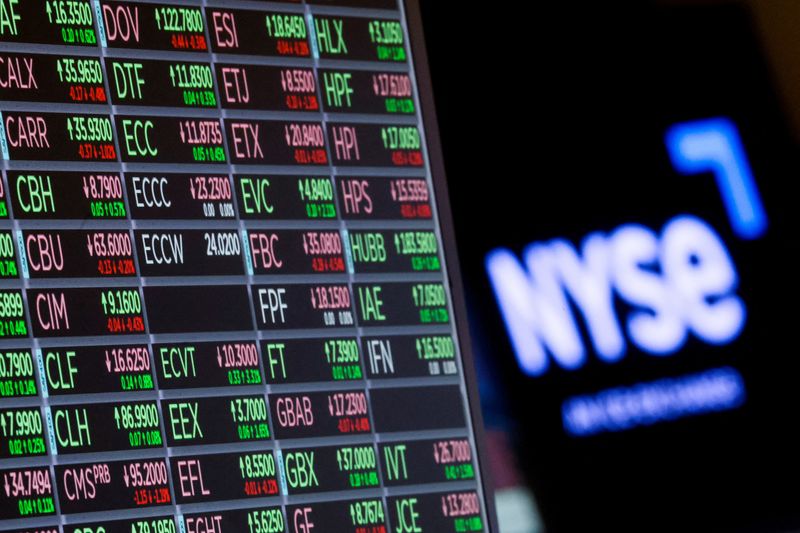 © Reuters
© Reuters
By Geoffrey Smith
Investing.com --- The U.S. updates us on the Federal Reserve's preferred gauge of inflation. Donald Trump becomes the first ex-President in U.S. history to face criminal charges, and Eurozone inflation is still going strong despite the unwinding of last year's energy spike. Here's what's moving markets on Friday, 31st March.
1. PCE prices, personal income and spending data due
The U.S. updates on the Federal Reserve’s preferred measure of inflation, the index for personal consumer expenditures. The numbers, due at 08:30 ET (12:30 GMT) will shed more light on how much leeway the Fed has to go easy on interest rates in order to allow recent concerns about banking stability to blow over.
The answer may well be: not much. Analysts expect the headline core PCE rate to stay at 4.7%. Those betting that the economic slowdown will force the Fed to pivot may take more cheer from February data for personal income and spending, which are both expected to show a slowdown from January.
Most market participants will be anxious to avoid copying developments in the Eurozone, where core consumer prices leaped by 1.2% last month, offsetting the reversal of last year’s energy price spike. Headline inflation slowed to 6.9% from 8.5% however.
2. Trump indicted over hush money payment to porn star
Donald Trump is to become the first ex-President of the United States to face criminal charges, after a Grand Jury voted to indict him over hush money payments made to a former porn star during the 2016 election campaign.
Trump’s vice president Mike Pence called the move “an outrage” that threatened to reopen a bitter partisan dispute. Trump’s critics, predictably, took the view that it was justice running its course, as with the ongoing trials of the January 6th rioters.
It still isn’t clear what charges Trump will face when he is arraigned (something predicted for Tuesday). The incident is unlikely to help the drafting of bipartisan legislation on Capitol Hill for the next two years, but given how low expectations were on that front, it is unlikely to be a market-relevant story in the near term.
3. Stocks set to open higher as Chinese ADRs grab the limelight again
U.S. stock markets are set to open higher again on Friday, supported by two factors which are if not contradictory, then at least inconsistent. On the one hand, fears around the stability of regional banks continue to ease. On the other, short-term interest rate futures reflect expectations that the Fed will start to cut interest rates earlier as a result of this month’s volatility.
By 05:35 ET (09:35 GMT), Dow Jones futures were up 60 points, or 0.2%, while S&P 500 futures were up a little less and Nasdaq 100 futures were essentially flat. The three main cash indices are on course for gains of between 1.4% and 2.0% this week, which will mean that the DJIA is the only one of the three not to be up in the first quarter of the year.
Stocks likely to be in focus later include JD.com (NASDAQ:JD) and Alibaba (NYSE:BABA), as details continue to dribble out about the IPOs of their various operating units. Also in focus will be Virgin Orbit (NASDAQ:VORB), which appears fatally wounded by the failure of a satellite launch earlier this year, and Bed Bath & Beyond (NASDAQ:BBBY), which announced plans to raise $300 million in equity in a fresh attempt to stave off bankruptcy.
4. Chinese economy gains traction - but not Huawei
China’s economic recovery gained a little more momentum in March, according to a closely-watched business survey released overnight.
The official composite purchasing managers index, a rough real-time proxy for economic activity, hit its highest level since before the pandemic. The improvement was due entirely to non-manufacturing, while the manufacturing PMI, which tracks mainly the country’s big state-owned enterprises, fell slightly to 51.9.
Elsewhere, Huawei said its profit fell nearly 70% last year under the ever-harsher impact of U.S. sanctions on it.
5. Oil holding weekly gains as OPEC+ meeting nears
Crude oil prices eased off slightly overnight but are set to close near a two-week high, supported by the data out of China. Market focus is turning to next week’s meeting of the so-called OPEC+ grouping, whose discipline has shown signs of cracking in recent weeks under the pressure of western sanctions on Russia.
By 05:45 ET, U.S. crude futures were down less than 0.1% at $74.34 a barrel, while Brent futures were down 0.3% at $78.39 a barrel.
The CFTC’s net positioning data and Baker Hughes’ rig count round off the week later.

